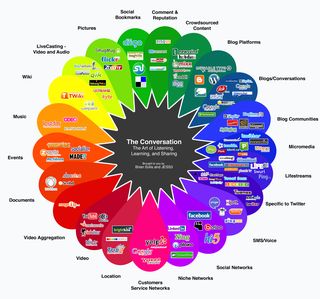 “It’s Complicated”. This could have been the best status to describe the relationship between Nestlé and its Facebook page a month ago. This situation began when Greenpeace launched a campaign against an alleged purchased by Nestlé of certain palm oil for use in KitKat candy bars. Environmental activists posted a negative video on YouTube and started an organized attack to Nestlé’s page in Facebook. They claimed that the use of palm oil is contributing to the destruction of Indonesia’s rain forest and endangering orangutans. Yesterday, Nestlé posted in Facebook a letter to Greenpeace written by Peter Brabeck-Letmathe, Chairman of Nestlé, calling for a moratorium on the destruction of rainforests and describing how the two organizations can meet this common goal. Although it seems that things are returning to normal, it is clear that this organized social warfare caught Nestlé off guard. As a matter of fact, the amount of the questioned palm oil purchased by Nestlé is only 1.25% of all the palm oil purchased by the company. However, one of main the problems was the initial defensive attitude of Nestlé in Facebook by posting last March 19 the following statement: “To repeat: we welcome your comments, but please don’t post using an altered version of any of our logos as your profile pic – they will be deleted.” This statement provoked a surge in the number of fans to Nestlé Facebook page, reaching in a few days more than 95,000 fans. Most of the new fans were anti-Nestlé.
“It’s Complicated”. This could have been the best status to describe the relationship between Nestlé and its Facebook page a month ago. This situation began when Greenpeace launched a campaign against an alleged purchased by Nestlé of certain palm oil for use in KitKat candy bars. Environmental activists posted a negative video on YouTube and started an organized attack to Nestlé’s page in Facebook. They claimed that the use of palm oil is contributing to the destruction of Indonesia’s rain forest and endangering orangutans. Yesterday, Nestlé posted in Facebook a letter to Greenpeace written by Peter Brabeck-Letmathe, Chairman of Nestlé, calling for a moratorium on the destruction of rainforests and describing how the two organizations can meet this common goal. Although it seems that things are returning to normal, it is clear that this organized social warfare caught Nestlé off guard. As a matter of fact, the amount of the questioned palm oil purchased by Nestlé is only 1.25% of all the palm oil purchased by the company. However, one of main the problems was the initial defensive attitude of Nestlé in Facebook by posting last March 19 the following statement: “To repeat: we welcome your comments, but please don’t post using an altered version of any of our logos as your profile pic – they will be deleted.” This statement provoked a surge in the number of fans to Nestlé Facebook page, reaching in a few days more than 95,000 fans. Most of the new fans were anti-Nestlé.
This example illustrates that the use of social media, in this case Social Customer Relationship Management (Social CRM or CRM 2.0), obeys to different rules than traditional ones. While traditional CRM is focused on transactions and driven by purchases, in contrast, Social CRM is focused on the interaction with the customers. In other words, the customer owns social media and brands cannot pretend anymore controlling them but engaging customers in online conversations. Social CRM should not be considered as a replacement of CRM systems, but as an extension of them. Nowadays, we are in the early days of Social CRM, and many companies are experimenting their presence in Facebook, Twitter, YouTube or other social networks, while they are still figuring out how to measure the ROI of such initiatives. However, those companies generally agree that Social CRM is an effective way to connect with their social customers, to identify online conversations that have an impact in their business, to enrich and enhance existing customer data, to track market reaction and to identify key trends. According to a recent report of Forrester Research, more than four in five US online adults now participate socially, and from a survey of 286 companies, 21% have already established customer communities (e.g. www.MyStarbucksIdea.com or StarBucks Facebook page with 6,8 million fans), and an additional 42% are piloting or interested in implementing customer communities. To that extent, the main CRM vendors (e.g., MS Dynamics, Oracle Siebel, Oracle CRM, salesforce.com, SAP CRM, etc.) are already adding web
2.0 tools to their existing CRM solutions such as wikis, blogs, RSS, social bookmarking, social networking, widgets and podcasting.
As it happens with all information systems, Social CRM is not a question of using one or another technology but defining clear objectives aligned with the company strategy. For instance, if we are interested in market research we can perform ongoing monitoring of our customers’ conversations instead of traditional surveys or focus groups. Moreover, if we want to reduce our customer support costs we can enable our customers to support each other through discussion threads. Therefore, companies when using Social CRM should think about customer engagement rather than customer management. First, companies should develop strategies and tools to enable those types of interactions with their customers. Second, they should also define their Social CRM metrics, through dashboards and tools interconnected to their CRM systems, to assess the degree of success of their initiatives in social networks. Social CRM is the natural consequence that consumers are massive
embracing social networks, and it is framed in a broader trend called the consumerization of the enterprise space, where the line between consumer and business technologies continues to blur. More are more employees demand as easy to use as consumer applications. Examples of the consumerization trend is the iPhone, where enterprise users are taking significant interest, or the CISCO last week announcement of releasing its WebEx online meeting business application for Apple’s iPad tablet platform. In a recent conference, Marc Benioff, CEO of salesforce.com, was wondering why in a company it easier to know through Facebook when a remote acquaintance is going to a movie than when our VP of sales is visiting a key customer. The answer is that in Facebook, content, apps and people are all fully integrated. Are we ready for a similar change in enterprise collaboration? Some initial answers can be found in the research study on the enterprise use of social media posted previously in this blog.
Nevertheless, social media is here to stay. We would be better change the status from “It’s Complicated” to “Engaged”.



SocialCRM is definitely gaining ground. Intelestream just published a whitepaper that deals with Social CRM in the context of small businesses. It can be found at http://www.intelestream.net/whitepapers.
Best!
Absolutely more engagement is needed by companies as more users become empowered through their use of the social media monster. Won’t it meant though more jobs for a few web savvy employees with their own department just created to appease and smooth relations. More pr for the technical age?
When told about Social Customer Relationship Management, most people think SCRM= Social Media + CRM.
However, Social CRM != CRM + Social Media. How about Social CRM = CRM + Social Computing? Since Social Computing ~= Sociology + Computing.
Also, can we not think about it as “Social Customer” Relationship Management rather than “Social” CRM? Where a “Social Cusotmer” is one who is more aware of herself, her power, her connections & the communities? And thus demands more from the corporates & enterprises?